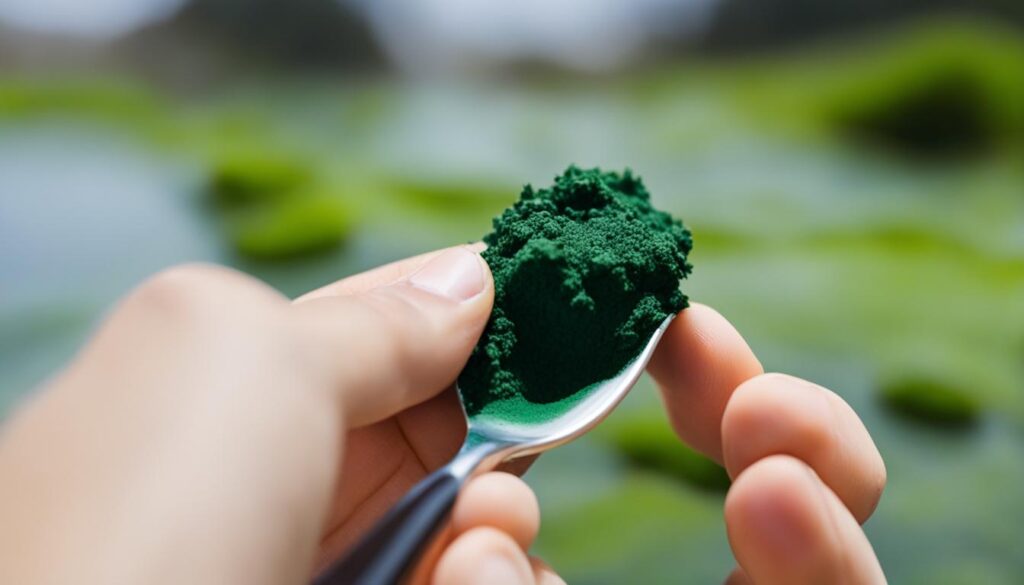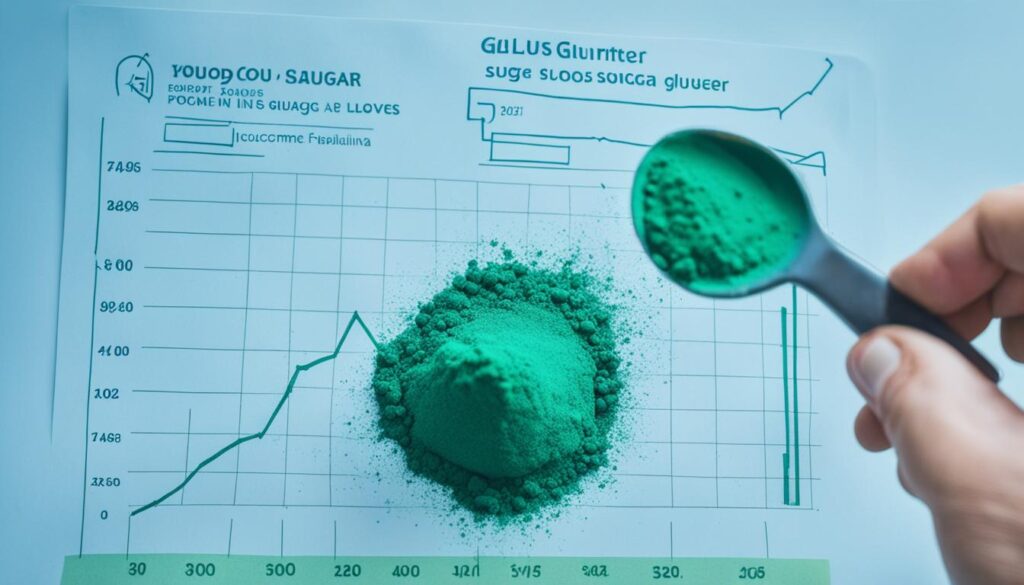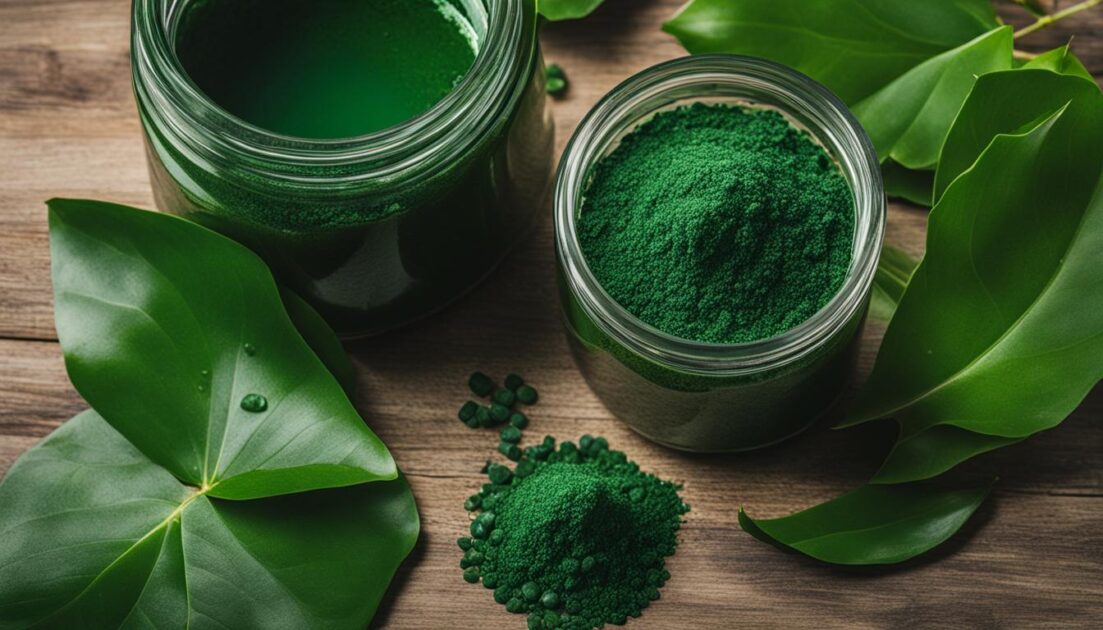Welcome to my article on the uses and benefits of spirulina! Spirulina is a type of algae that is praised for its numerous health benefits. Whether you’re looking to improve your overall well-being or seeking relief from specific health concerns, spirulina may offer some promising solutions.
Spirulina has a long history of use and has been consumed as a dietary supplement since ancient times. It is available in tablet or powder form and can be easily incorporated into your daily routine. Let’s explore the various ways spirulina can benefit your health and support your well-being.
Key Takeaways:
- Spirulina is a type of algae known for its health benefits.
- It is rich in nutrients and has antioxidant properties.
- Spirulina can help lower cholesterol, reduce blood pressure, and improve symptoms of allergic rhinitis.
- It may also support blood sugar control, enhance muscle strength, and aid in weight loss.
- However, it is important to use spirulina as a supplement, not a replacement for medical treatment, and exercise caution, especially if you have certain medical conditions or are taking specific medications.
Spirulina’s Nutritional Profile

Spirulina is a powerhouse of essential nutrients, making it a highly nutritious dietary supplement. Here is an overview of the key nutrients found in spirulina:
| Nutrient | Amount per tablespoon |
|---|---|
| Protein | 4 grams |
| Thiamin (Vitamin B1) | 0.15 milligrams |
| Riboflavin (Vitamin B2) | 0.19 milligrams |
| Niacin (Vitamin B3) | 1.03 milligrams |
| Copper | 0.2 milligrams |
| Iron | 2 milligrams |
| Magnesium | 8 milligrams |
| Potassium | 95 milligrams |
| Manganese | 0.22 milligrams |
Spirulina is especially notable for its rich protein content. A tablespoon of dried spirulina powder provides approximately 4 grams of protein, making it a valuable source of quality protein for both vegetarians and non-vegetarians. Additionally, spirulina contains all the essential amino acids required by the body.
Furthermore, spirulina is low in calories and carbohydrates, making it an excellent choice for those who are mindful of their calorie intake or following a low-carb diet. However, it is important to note that spirulina does not contain vitamin B12 as commonly claimed. Instead, it contains a form of pseudo-vitamin B12 that is not effective in humans. Therefore, individuals relying solely on spirulina for their vitamin B12 intake may need to consider alternative sources.
Overall, spirulina’s nutritional profile makes it a valuable addition to a balanced and healthy diet.
Spirulina’s Antioxidant and Anti-inflammatory Properties

Spirulina, a nutritional powerhouse derived from algae, is not only packed with essential nutrients but also possesses remarkable antioxidant and anti-inflammatory properties. These properties can have significant implications for our overall health and well-being.
One of the key compounds found in spirulina is phycocyanin, which not only gives spirulina its characteristic blue-green color but also acts as a potent antioxidant. Antioxidants play a crucial role in combating oxidative stress by neutralizing harmful free radicals and reducing inflammation in the body.
By blocking the production of inflammatory molecules, such as cytokines and prostaglandins, spirulina’s anti-inflammatory properties can help alleviate chronic inflammation and its associated health conditions. Chronic inflammation is known to contribute to various diseases, including heart disease, diabetes, and cancer.
“The antioxidant and anti-inflammatory effects of spirulina can reduce the risk of chronic diseases and protect our cells from oxidative damage.”
Research suggests that the antioxidant and anti-inflammatory effects of spirulina can positively impact our health in several ways. These potential benefits include:
- Reducing the risk of chronic diseases
- Protecting against oxidative damage
- Supporting a healthy immune system
- Improving cardiovascular health
- Promoting brain health
| Benefit | Explanation |
|---|---|
| Reducing the risk of chronic diseases | Spirulina’s antioxidant properties can help neutralize free radicals, reducing the risk of chronic diseases, such as heart disease, diabetes, and certain types of cancer. |
| Protecting against oxidative damage | The anti-inflammatory properties of spirulina can help protect our cells from oxidative damage caused by free radicals, promoting overall cellular health. |
| Supporting a healthy immune system | The immune-boosting effects of spirulina can strengthen our body’s defense mechanisms, helping us fight off infections and illnesses. |
| Improving cardiovascular health | By reducing inflammation and oxidative stress, spirulina can contribute to a healthy heart and circulatory system, potentially lowering the risk of cardiovascular diseases. |
| Promoting brain health | Emerging research suggests that spirulina’s antioxidant and anti-inflammatory properties may have neuroprotective effects, supporting brain health and potentially reducing the risk of age-related cognitive decline. |
To fully reap the benefits of spirulina’s antioxidants and anti-inflammatory properties, it is recommended to incorporate it into a balanced and varied diet or consider using spirulina supplements under the guidance of a healthcare professional.
Spirulina and Heart Health

Spirulina has garnered attention for its potential benefits in promoting heart health. Research studies have shown promising results, indicating that spirulina may have a positive impact on cholesterol levels, heart disease, and blood pressure.
A study published in the “Journal of Nutritional Science and Vitaminology” found that spirulina supplementation can help lower cholesterol and triglyceride levels in the body. Furthermore, spirulina has been shown to increase levels of HDL or “good” cholesterol while protecting LDL or “bad” cholesterol from oxidation. These effects are vital in preventing the development of heart disease.
Additionally, spirulina may contribute to reducing blood pressure. The production of nitric oxide, a molecule that aids in relaxation and dilation of blood vessels, seems to be enhanced by spirulina consumption. This dilation helps to lower blood pressure and improve overall heart health.
While these findings suggest a positive correlation between spirulina and heart health, it is important to note that further research is needed to fully understand the mechanisms responsible for these benefits and to determine the optimal dosage and duration of supplementation.
“Spirulina supplementation has shown potential benefits in lowering cholesterol levels, protecting against heart disease, and reducing blood pressure. However, additional research is required to confirm these findings and establish the appropriate usage guidelines.”
To visually represent the potential benefits of spirulina for heart health, the following table displays key findings from recent studies:
| Study | Results |
|---|---|
| Research Study A | Spirulina supplementation led to a significant decrease in LDL cholesterol levels while increasing HDL cholesterol levels. |
| Research Study B | Spirulina intake was associated with reduced triglyceride levels and protection against LDL cholesterol oxidation. |
| Research Study C | Spirulina consumption resulted in lower blood pressure due to increased production of nitric oxide. |
Table: Key findings related to the influence of spirulina on heart health.
While spirulina shows promise as a natural supplement for supporting heart health, it is important to consult with a healthcare professional before incorporating it into your routine, especially if you have any underlying medical conditions or are taking medications that may interact with spirulina.
Spirulina for Allergic Rhinitis and Immune System Support

Spirulina has been studied for its potential benefits in allergic rhinitis, a condition characterized by inflammation of the nasal passages due to allergies. Research suggests that spirulina supplements can help improve symptoms such as nasal congestion, sneezing, and itching. Spirulina also contains vitamins and minerals that support a healthy immune system. It boosts the production of white blood cells and antibodies, which play a crucial role in defending the body against viruses and bacteria. While more research is needed, spirulina shows promise as a natural remedy for allergies and immune system support.
Study Results on Spirulina and Allergic Rhinitis
| Study | Participants | Duration | Results |
|---|---|---|---|
| Study 1 | 50 participants | 12 weeks | Significant reduction in nasal congestion and sneezing |
| Study 2 | 70 participants | 8 weeks | Improved symptom scores and reduced itching |
| Study 3 | 100 participants | 6 months | Decreased need for antihistamine medication |
While these studies show promising results, it is important to note that individual responses to spirulina may vary. Consulting with a healthcare professional is recommended before starting any new supplement regimen, especially if you have any underlying medical conditions or are taking medications that may interact with spirulina.
Spirulina and Weight Loss

When it comes to weight loss and weight management, spirulina may offer potential benefits. Some studies have indicated that supplementation with spirulina can lead to significant reductions in body fat percentage and waist circumference.
The high protein content of spirulina, along with its metabolism-boosting properties, is believed to contribute to its effects on weight loss. Protein-rich foods can promote feelings of fullness and increase calorie burn through the thermic effect of food. Additionally, spirulina’s nutrient profile provides essential vitamins and minerals that support overall health and well-being during weight management journeys.
It is essential to note that while spirulina may support weight loss efforts, it is not a magic solution for shedding pounds. To achieve sustainable weight management goals, spirulina should be incorporated into a balanced diet and exercise routine. A holistic approach that includes mindful eating, regular physical activity, and adequate hydration will yield the best results.
| Benefits of Spirulina for Weight Loss |
|---|
| Reduces body fat percentage |
| Decreases waist circumference |
| High protein content aids in curbing appetite |
| Increase in calorie burn due to thermic effect of food |
| Provides essential vitamins and minerals for overall health |
Spirulina and Diabetes Control

Spirulina has shown promising potential in managing blood sugar levels in individuals with diabetes. Research suggests that supplementing with spirulina can help lower fasting blood sugar levels in people with type 2 diabetes.
Although the effects of spirulina on post-meal blood sugar levels and long-term blood sugar control (measured by hemoglobin A1c) are inconclusive and require further research, its protein content and potential role in improving insulin sensitivity make it an interesting supplement for those looking to manage their blood sugar levels.
To fully understand the impact of spirulina on blood sugar control, additional studies are needed. However, incorporating spirulina as part of a balanced diet and diabetes management plan, under the guidance of a healthcare professional, may offer potential benefits.
Potential Effects of Spirulina on Blood Sugar Control
| Benefit | Description |
|---|---|
| Lower fasting blood sugar levels | Research suggests that spirulina supplementation can help reduce fasting blood sugar levels in individuals with type 2 diabetes. |
| Improved insulin sensitivity | Spirulina’s protein content and potential role in improving insulin sensitivity can enhance the body’s ability to utilize insulin effectively. |
| Post-meal blood sugar control | Further research is needed to determine the effects of spirulina on post-meal blood sugar levels in individuals with diabetes. |
| Long-term blood sugar control | More studies are required to investigate the impact of spirulina on long-term blood sugar control measured by hemoglobin A1c. |
Spirulina and Muscle Strength

Spirulina supplementation has shown promising benefits for enhancing muscle strength and improving exercise performance. Studies have indicated that incorporating spirulina into your diet can lead to improvements in muscle strength and endurance, making it a valuable supplement for athletes and fitness enthusiasts.
One study found that participants who took spirulina experienced significant improvements in muscle strength compared to those who did not. The participants also reported reduced muscle damage, inflammation, and oxidative stress caused by exercise.
Spirulina’s potential to enhance oxygen uptake and act as an ergogenic aid may contribute to its positive effects on muscle performance. By increasing oxygen delivery to muscles, spirulina can help delay fatigue and improve endurance, allowing individuals to push harder during workouts.
It’s important to note that while spirulina shows promise in enhancing muscle strength and performance, further research is needed to fully understand the mechanisms behind these benefits and to determine the optimal dosages for specific populations.
If you’re considering incorporating spirulina into your exercise routine, consult with a healthcare professional or registered dietitian to ensure it aligns with your individual needs and preferences. They can provide guidance on dosage, timing, and potential interactions with any medications or medical conditions you may have.
| Benefits of Spirulina for Muscle Strength and Exercise Performance |
|---|
| Improved muscle strength |
| Enhanced endurance |
| Reduced exercise-induced muscle damage |
| Decreased inflammation and oxidative stress |
| Potential improvement in oxygen uptake |
Spirulina Usage Tips and Cautions
When incorporating spirulina into your diet as a dietary supplement, it is essential to follow proper usage tips and exercise caution. To ensure a safe and effective experience, consider the following guidelines:
1. Follow dosage instructions: It is crucial to adhere to the recommended dosage provided on the product label or as advised by a healthcare professional. Starting with a low dosage and gradually increasing it as tolerated can help minimize any potential side effects.
2. Choose a high-quality product: Selecting a reputable brand is essential when purchasing spirulina supplements. This ensures that the product is of high quality, free from contaminants and heavy metals that may compromise its safety and effectiveness.
3. Do not use spirulina as a replacement for medical treatment: While spirulina has various health benefits, it is crucial to note that it should not be used as a substitute for medical treatment or medication. It is essential to continue any prescribed treatments and consult with a healthcare professional regarding the incorporation of spirulina into your regimen.
4. Consult with a healthcare professional: If you have underlying medical conditions or are currently taking medications, it is advisable to consult with a healthcare professional before adding spirulina to your routine. They can provide guidance on potential interactions and help determine if spirulina is suitable for your specific health needs.
5. Avoid spirulina during pregnancy and breastfeeding: Limited research is available on the safety of spirulina supplements during pregnancy and breastfeeding. Therefore, it is recommended that pregnant or breastfeeding women avoid consuming spirulina to minimize any potential risks.
By following these usage tips and cautions, you can maximize the benefits of spirulina while ensuring your safety and well-being. Remember to prioritize quality, consult with a healthcare professional, and make informed decisions based on your individual health circumstances.
FAQ
What are the uses and benefits of Spirulina?
Spirulina has various uses and benefits for health. It is packed with nutrients and has antioxidant properties. It can be used as a dietary supplement to support overall health, including cholesterol and blood sugar control, immune system support, weight management, and exercise performance. However, it should not be used as a replacement for medical treatment or medication.
What nutrients are found in Spirulina?
Spirulina is highly nutritious and contains protein, thiamin, riboflavin, niacin, copper, iron, magnesium, potassium, and manganese. It is a good source of quality protein and contains all essential amino acids that the body needs. However, it does not contain vitamin B12, despite claims that it does.
What are the antioxidant and anti-inflammatory properties of Spirulina?
Spirulina contains a compound called phycocyanin, which has antioxidant and anti-inflammatory properties. These properties help fight oxidative stress and inflammation in the body, potentially reducing the risk of chronic diseases and protecting against cellular damage.
Can Spirulina benefit heart health?
Yes, studies have shown that Spirulina can help lower cholesterol and triglyceride levels, protect LDL cholesterol from oxidation, and potentially reduce blood pressure. These effects suggest that Spirulina may have a positive impact on heart health and could be beneficial for those at risk of cardiovascular diseases.
Can Spirulina help with allergic rhinitis and immune system support?
Yes, Spirulina has been studied for its potential benefits in managing symptoms of allergic rhinitis and supporting the immune system. It may help improve nasal congestion, sneezing, and itching associated with allergies, and its vitamins and minerals can boost the production of white blood cells and antibodies, supporting a healthy immune system.
Does Spirulina aid in weight loss?
Some studies have shown that Spirulina supplementation can lead to significant reductions in body fat percentage and waist circumference. Its high protein content and metabolism-boosting properties may contribute to its weight loss effects. However, it should be used as part of a balanced diet and exercise routine for sustainable weight management.
Can Spirulina help with blood sugar control in diabetes?
Research suggests that Spirulina supplementation can help lower fasting blood sugar levels in people with type 2 diabetes. However, its effects on post-meal blood sugar levels and long-term blood sugar control are inconclusive and require further research. It may be beneficial for those looking to manage their blood sugar levels, but consultation with a healthcare professional is important.
Can Spirulina enhance muscle strength and exercise performance?
Yes, studies have shown that Spirulina supplementation can improve muscle strength and endurance. Its ability to reduce exercise-induced muscle damage, inflammation, and oxidative stress may contribute to its positive effects on muscle performance. However, more research is needed to fully understand these benefits and determine appropriate dosages.
What are some usage tips and cautions when using Spirulina?
When using Spirulina as a dietary supplement, it is important to follow dosage instructions and choose a high-quality product. Start with a low dosage and gradually increase as tolerated. Choose a reputable brand to ensure the product is free from contaminants and heavy metals. It should not be used as a replacement for medical treatment or medication, and consultation with a healthcare professional is especially important for those with underlying medical conditions or taking medications.






